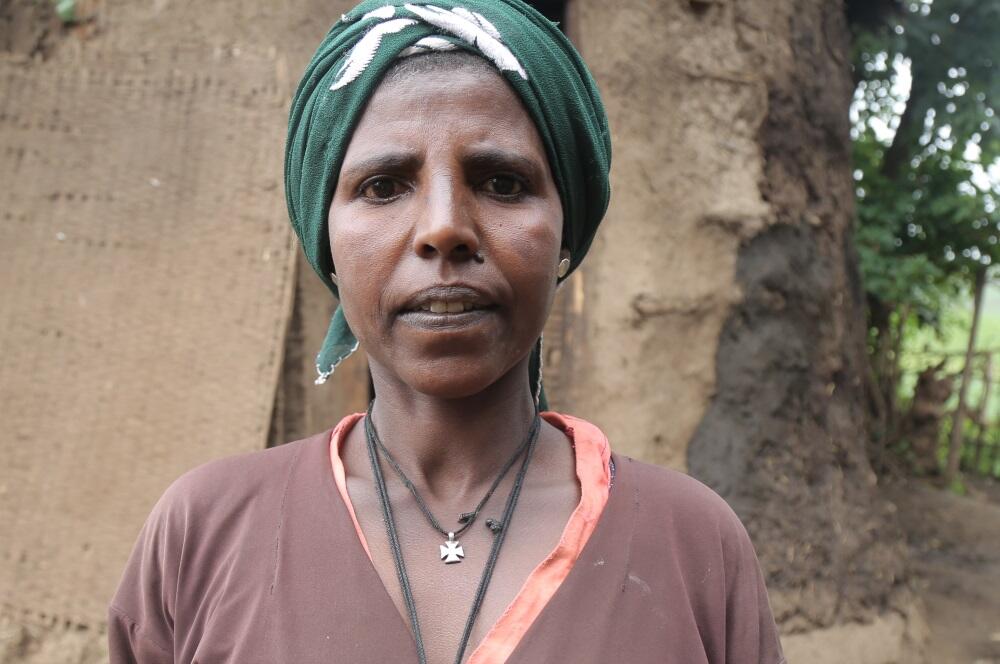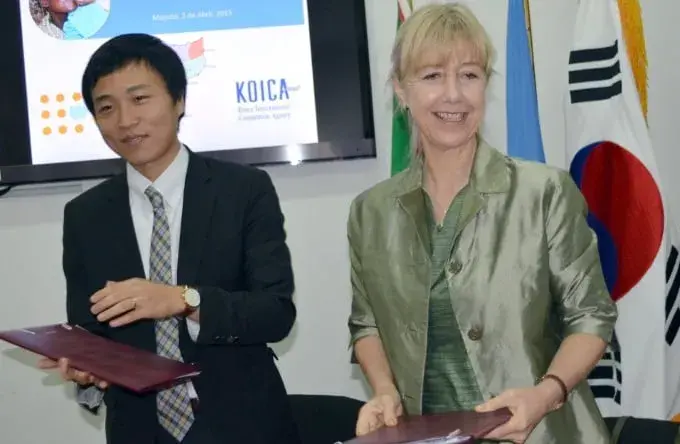DEBAYTILATGIN DISTRICT, Amhara Region, Ethiopia: Hulunayehu Belay’s family of nine ekes out a living by farming a small plot of land at the edge of a mountain, supplemented by her husband’s small income earned as a priest. Thirteen years ago they made a significant decision that would affect the future of their family.
Mrs. Belay and her husband, Priest Leul Hunegnaw, agreed they could not afford to have more children and so they would start using family planning. This was a big concession from her husband, considering his standing as a priest and the fact that they live in a conservative community.
“We agreed that we need to use family planning to save our resources, educate and raise our children well,” she says.
At first, Mrs. Belay used an injectable contraceptive, and she continued to do so for quite some time. But she found it difficult to make time to visit the Health Post to receive an injection every three months.
In her large household, each minute counts in attending to her backbreaking chores to ensure that her family has food on their plates. On top of this, she is expected to join her husband in farm work.
Yet to ensure the contraception remained effective, she could not miss an appointment for the injection for any reason. This was when she convinced her husband to allow her to switch to a long-term method. She started using the three-year contraceptive implant. Later, she would switch to the five-year implant method, which she still uses to this day.
I had my children spaced very closely to each other, which affected their health and well-being, as well as mine.
Mrs. Belay explains their decision: “I had my children spaced very closely to each other, which affected their health and well-being, as well as mine.”
Based on the counselling she received from a Health Extension Worker (community health worker), she and her husband decided to try a long-term method. “If I want to, I can get the implant removed and get pregnant again,” she says with confidence.
Ethiopia has seen a significant increase in the use of modern family planning methods since 2000. Here's why.
Remarkable efforts to increase access to family planning
The use of modern family planning methods among currently married women aged 15 to 49 years has increased phenomenally in Ethiopia, from 8 per cent in 2000 to 36 per cent in 2016 (DHS). Much of the credit for this good result goes to the Health Extension Programme, which has taken family planning services to people’s doorsteps. Significantly, the fertility rate has also decreased during the same period, from 5.9 births per woman to 4.6.

© UNFPA Ethiopia
Yet currently, a little over one in five women in the country still have an unmet need for family planning, and this figure is much higher in rural areas (DHS, 2016). Moreover, the method mix is still skewed towards short-acting family planning methods although the share of long-acting methods has shown a remarkable increase in the past five years.
Since the FP2020 commitment in 2012, Ethiopia has added more than 2 million new users of modern contraception. This has translated into averting 8 million unintended pregnancies, 2 million unsafe abortions and 20,000 maternal deaths – as a result of the protection provided by the modern contraceptives.
Around one third of Ethiopia’s reproductive health commodities and life-saving medicine needs are being provided through UNFPA Supplies. A 2016 survey on stock availability, which was supported by UNFPA Supplies, showed that at least three modern contraceptive methods at primary level and at least five at secondary and tertiary level were being offered at 95 per cent of the service delivery points.
Enabling women to unleash their potential

Priest Leul Hunegnaw. She says her use of contraception has had a
liberating effect. © UNFPA Ethiopia
For Mrs. Belay, family planning has had a liberating effect. It has given her the time and energy she needed to focus on improving her family’s circumstances. She has had more time to look after her children, to ensure that they attended school and performed well. Her efforts have been rewarded. Two of her children have graduated from college and are now working in the civil service. The remaining five children are still at school at various levels.
Mrs. Belay has become a leader in her community. She heads the Women Development Group, a network of 30 to 35 women volunteers that is playing a critical role in mobilizing for women’s health. The volunteers bring change on maternal health and the fight against harmful practices like female genital mutilation (FGM) and child marriage. Mrs. Belay uses their bimonthly meetings and other platforms available to her to teach women about the benefits of family planning and giving birth at a health institution.
She is pleased with the family planning information and services she receives from the Health Post and Health Centre, and the positive changes they have brought about in her family’s life.
My husband is also happy as I now have the time and energy to support him in arduous farm work.
“My husband is also happy as I now have the time and energy to support him in arduous farm work,” she says.
Mrs. Belay is now 45 years old. It has been six years since she had her last child. For some time now, she has juggled with the idea of having one more child – a girl, as all her children are boys. She has consulted health workers about this matter and so far, has been discouraged by them. It could be risky to get pregnant at this age, she has been told. Also, she may soon have a granddaughter from one of her sons. Yet she is happy that modern family planning gives her the ability to weigh up her options.
- By Abraham Gelaw



